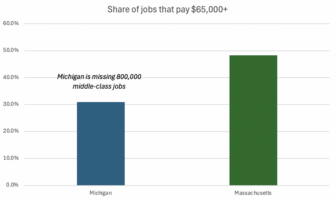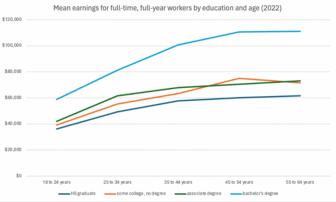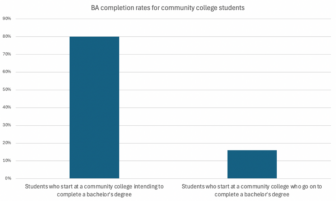The Washington Post in an article entitled The interesting thing that happened when Kansas cut taxes and California hiked them provides an update on the economic fortune of the two states. Its a topic we covered previously in a post entitled California growing, Kansas not so much:
A year and a half later, same results. As the Post writes:
California’s economy grew by 4.1 percent in 2015, according to new numbers from the Bureau of Economic Analysis, tying it with Oregon for the fastest state growth of the year. That was up from 3.1 percent growth for the Golden State in 2014, which was near the top of the national pack.
The Kansas economy, on the other hand, grew 0.2 percent in 2015. That’s down from 1.2 percent in 2014, and below neighboring states such as Nebraska (2.1 percent) and Missouri (1.2 percent). Kansas ended the year with two consecutive quarters of negative growth — a shrinking economy. By a common definition of the term, the state entered 2016 in recession.
The reason, of course, why the two states are being compared is that they have taken the exact opposite approach to taxes. California big tax increase, Kansas really big tax cuts. And, of course, that led to conservative economists predicting the opposite results. Wrong again!
One of the reasons that California was predicted to be on the path of economic calamity was that the core of their tax increase was increased taxes on the rich to a national high marginal tax rate of 13.3 percent. Writing about a recent study led by Stanford’s Cristobal Young, CBS reports:
But Young’s research — which examined the tax records of every U.S. millionaire over more than a decade, some 3.7 million filers — makes clear just how rarely millionaires in the U.S. actually move, whether to take advantage of lower taxes or for any other reason. Of the roughly 500,000 households per year that report at least $1 million in income on their tax returns, only 2.4 percent, or 12,000 millionaires, migrate to another state; that compares with 2.9 percent for the population at large.
Of the top income earners who do leave a state, only a sliver — just over 2 percent — seem to be spurred by a wish to cut their taxes, according to the study.
Why don’t more rich people follow Tepper’s (a New Jersey hedge fund manager) lead and head to Florida or one of the eight other states in the U.S. that make do without a state income tax? Because for most millionaires, getting and staying rich is intimately connected to where they live.
Precious professional and social connections, often nurtured over years in a given industry, tend to bind the wealthy to where they live. So does family, since 90 percent of millionaires are married (compared with 58 percent for the general population) and are more likely to have children.
(You can find Young’s study here.)
Rather than low taxes being the magic economic elixir that drives economic growth the Post writes:
It is perhaps less remarkable — or surprising — that California has powered along. The recovery nationwide has favored massive metropolitan areas stocked with high-skilled workers, which is to say places such as Los Angeles, San Jose and San Francisco. The damage from California’s deep housing crash has slowly healed in places such as the Central Valley.
Exactly! In an increasingly knowledge-based economy, talent trumps low taxes. Talent is increasingly concentrating in big metropolitan areas with vibrant central cities which California has lots of and Kansas doesn’t.
More evidence of the economic primacy of talent rich cities is where venture capital is being invested. In a City Lab article Richard Florida reports:
Venture capital is the driving force of high-tech innovation, spurring revolutionary companies from Intel, Apple, and Genentech to Twitter, Facebook, and Uber. But venture capital investment in startup companies is increasingly concentrated in a small number of urban neighborhoods in America’s major cities. That’s the main takeaway of a new report I co-authored with my Martin Prosperity Institute colleague Karen King.
… Ultimately, venture capital investment and startup activity is strikingly concentrated across U.S. neighborhoods. The top 20 neighborhoods alone account for more than $10 billion in venture capital investment—roughly a third of the national total. In addition, less than one percent (0.2 percent) of all ZIP codes, or 83 neighborhoods, attract more than $100 million in venture capital investment, representing over 60 percent of all venture capital investment nationwide.
Of the top twenty neighborhoods sixteen are in California. The other four are in Boston, New York and Dallas.
As the Post concludes:
Few, if any, economists would say today that the recovery has been sufficient for all Californians. But almost no one can say that raising taxes on the rich killed that recovery. Or that given a choice of the two states’ economic performances over the past few years, you’d rather be Kansas.
Its a lesson Michigan policy makers should learn quick.






